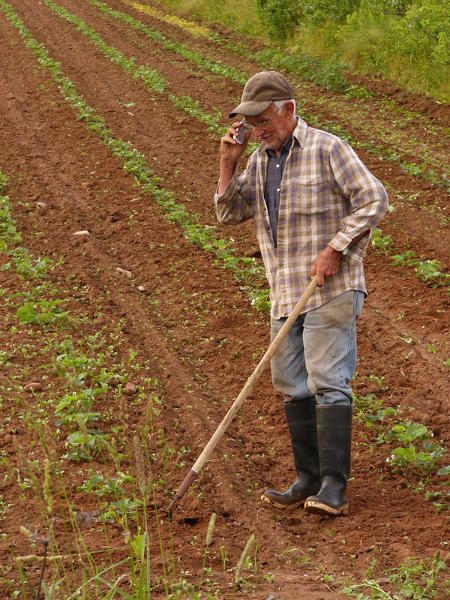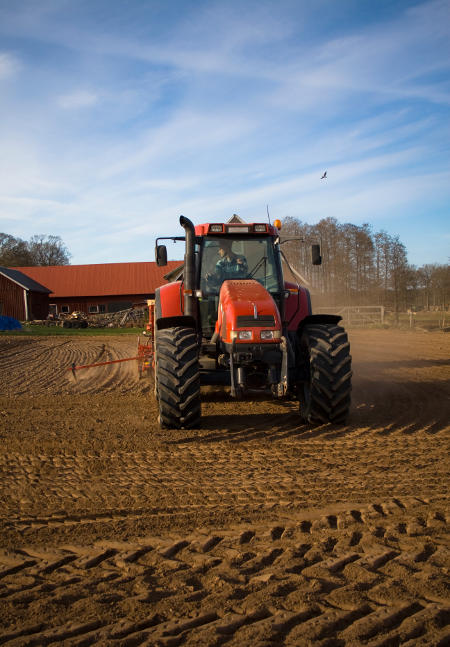A Pepper Grinder Post
Curses – Part 4
In the last post, we finished looking at what God said to Eve after the Fall of Man in the Garden of Eden. Now I want to take a look at what was said to Adam, before we move on to general thoughts about the Fall. Here is what God said:
"Because you listened to your wife and ate from the tree I commanded you not to eat from, the land is cursed. With sadness you will eat from it all the days of your life. It will sprout thorns and thistles, and you will eat plants of the field. By the sweat of your face you will eat food until you return to the ground from which you were taken. You are dust, and you will return to dust." (Genesis 3:17-19, my translation)
 Just as God spoke to Eve about the effects of human disobedience on a quintessentially feminine activity, he spoke to Adam about something that was especially tied to men--the providing of food. As with the woman, we need to be careful of interpreting this too narrowly. I don't think this means that, for example, I have escaped from the Fall because I work with computers and can get my food by just plucking it off the shelves of a grocery store. Believe me, there is plenty of frustration, disappointment, and hard work involved in IT, and I doubt there is any line of work that has escaped from this. Sadness and hardship have seeped into all we do. I may not be doing the hot and back-breaking work of pulling thorns and thistles out of a Middle Eastern field, but I have times I am staying up late to try to get all our servers patched before they get infected with the latest computer virus. Instead of grasshoppers eating the crops just when I was getting ready to harvest them, I may have people making unreasonable demands, or scheduling long but useless meetings that eat up the time I need.
Just as God spoke to Eve about the effects of human disobedience on a quintessentially feminine activity, he spoke to Adam about something that was especially tied to men--the providing of food. As with the woman, we need to be careful of interpreting this too narrowly. I don't think this means that, for example, I have escaped from the Fall because I work with computers and can get my food by just plucking it off the shelves of a grocery store. Believe me, there is plenty of frustration, disappointment, and hard work involved in IT, and I doubt there is any line of work that has escaped from this. Sadness and hardship have seeped into all we do. I may not be doing the hot and back-breaking work of pulling thorns and thistles out of a Middle Eastern field, but I have times I am staying up late to try to get all our servers patched before they get infected with the latest computer virus. Instead of grasshoppers eating the crops just when I was getting ready to harvest them, I may have people making unreasonable demands, or scheduling long but useless meetings that eat up the time I need.
We spent a lot of time (some might say way too much time) discussing the meaning of the word etsev (translated sometimes as "pain," sometimes as "hard work," and by a few of us as "sorrow") when we talked about Eve. In the statement to Adam, it would not seem too strange to translate it as hard work, since God goes on in the very next sentence to talk about eating food by "the sweat of your face." The thing is, it only makes sense to translate one word the same way in these two linked pronouncements. Since I think sorrow makes the most sense in the passage as a whole, I'm not going to go back on that here.
God finishes his pronouncement to Adam with the words, "You are dust, and you will return to dust." Does this mean that people were immortal before the Fall? I can't say for sure, but this statement, along with God's mysterious statement about the Tree of Life in Genesis 3:22, does make it sound as though Adam and Eve would have enjoyed immortality if they had not disobeyed God.
This brings us to an interesting question: Is it wrong to try to eliminate the effects of the Fall? I have heard that Queen Victoria took the somewhat controversial step of using chloroform during the deliveries of her eighth and ninth children. There may have been various reasons for society and most of the medical establishment to oppose the use of chloroform during childbirth, but one of the reasons was a theological one. People felt that by using a drug to diminish the pain of childbirth, women were rebelling against the judgment God had pronounced on their sex. If you've read the earlier articles in this series, you know that I don't believe God was predicting physical pain in childbirth when he spoke to Eve, but even if he were, would it be wrong to try to lessen that judgment?
 One of the things that gets me the most about the idea that women should not be allowed to do anything to make childbirth easier is how sexist it is. My wife and I are not into what passes for feminism in this day and age, but this kind of thing just galls me. Throughout history, men have been trying to find ways to improve agriculture. They have looked for devices and techniques to get the earth to yield more crops with less effort. They have searched for ways to eliminate weeds and insect pests. I have got to believe that this effort was going on in Victorian England. So why was it okay for men to mitigate the effects of the Fall, but not for women?
One of the things that gets me the most about the idea that women should not be allowed to do anything to make childbirth easier is how sexist it is. My wife and I are not into what passes for feminism in this day and age, but this kind of thing just galls me. Throughout history, men have been trying to find ways to improve agriculture. They have looked for devices and techniques to get the earth to yield more crops with less effort. They have searched for ways to eliminate weeds and insect pests. I have got to believe that this effort was going on in Victorian England. So why was it okay for men to mitigate the effects of the Fall, but not for women?
However, let's suppose that someone was theologically consistent about this. They would say that women should not use drugs to make childbirth easier, and men should not use tractors, herbicides, or pesticides when farming. Would this be a Biblical position? I don't think so. The reason I think this would be wrong thinking is that it would misunderstand what God was saying to Adam and Eve in Genesis. It also underestimates the power of God.
I do not think God was pronouncing a curse on Adam and Eve in Genesis 3. I believe he was telling them plainly what the results would be of what they had done. They had departed from God's path and chosen a different way. He was telling them, "Here's where your road leads." They had opened Pandora's box, and God was telling them what had been released.
I also think it is laughable to think that if God had pronounced a curse on people, they could overcome it. To me, it seems like the ultimate in 19th century hubris (which is unfortunately not at ALL limited to the 19th century) to think that we, with our puny technical innovations, could ever slip one over on the God who created all life out of nothing.
 To me, the process of trying to overcome the effects of the Fall is like a gigantic game of Whac-A-Mole. Remember Whac-A-Mole? That arcade game where you stand in front of a surfce with five holes, holding a mallet. Suddenly, the head of a plastic mole pops out of one of the holes, and you (I'm sure you didn't see this coming) whack it, so it pops back down the hole. But guess what happens next? A mole pops out of another hole, or maybe two moles pop out of holes on opposite sides of the surface. No matter how well you do at whacking the moles that pop up, they just keep coming. In the same way, all our innovations just seem to switch one source of frustration, exhaustion, or disappointment with another. Those of us in America live in one of the most advanced societies in the history of the world. Most of us don't have to do much hard physical labor. And what do we have to show for it? Problems with obesity and diabetes. Angst and dissatisfaction. Addictions. We have whacked one mole, but two others have popped up. We may have partially eliminated one or two symptoms of the Fall, but the disease is still there.
To me, the process of trying to overcome the effects of the Fall is like a gigantic game of Whac-A-Mole. Remember Whac-A-Mole? That arcade game where you stand in front of a surfce with five holes, holding a mallet. Suddenly, the head of a plastic mole pops out of one of the holes, and you (I'm sure you didn't see this coming) whack it, so it pops back down the hole. But guess what happens next? A mole pops out of another hole, or maybe two moles pop out of holes on opposite sides of the surface. No matter how well you do at whacking the moles that pop up, they just keep coming. In the same way, all our innovations just seem to switch one source of frustration, exhaustion, or disappointment with another. Those of us in America live in one of the most advanced societies in the history of the world. Most of us don't have to do much hard physical labor. And what do we have to show for it? Problems with obesity and diabetes. Angst and dissatisfaction. Addictions. We have whacked one mole, but two others have popped up. We may have partially eliminated one or two symptoms of the Fall, but the disease is still there.
I can picture someone reading this and saying, "Yeah, I can see all this, but Christ came so we could be freed from the effects of the Fall." I have two responses to this. "Yes," and "Not yet." There are probably a number of New Testament verses we could look at to illustrate what I mean, but Hebrews 10:14 says it well.
For by one sacrifice he has made perfect forever those who are being made holy. (NIV)
The first verb (translated as "he has made perfect") is in the perfect tense, indicating something that is over and done with. When Christ died and rose again, it was finished. For those of us whom he had chosen from before the foundation of the world, our sin was paid for. This includes sin stemming from the bad choices we make, and the rebellion and selfishness that exists in the heart of even the tiniest baby, ever since Adam and Eve rebelled against God.
The second verb (translated as "being made holy") is a present participle, indicating an ongoing, repetitive process. He is making us holy, but we will never get to a point in this life where we can say the process is finished. Until that process is finished, I don't believe we can say we are totally free from the results of the Fall. Also, even if we could become perfect, we would still live in a world where the effects of the Fall would touch us every day. Look at Jesus. He was perfect, and yet he still became hungry, thirsty, exhausted, exasperated, and lonely.
Another question I'm sure some of us with a modern world-view might have is why we're being punished for Adam and Eve's mistake. In ancient times, the idea that children suffered for the mistakes of their parents was seldom questioned, but this is not so easy for many of us (including me) to accept. It just doesn't seem right. Here again, I think we are misunderstanding what really happened in Genesis chapter three.
God was not like some dictator who was furious that one of his subjects had dared to disobey him, and vowed to take revenge, not just on the evildoer, but on all his descendants for all time. I believe God was more like a scientist warning the people in a village against burying radioactive waste next to their well. When future generations of people in that village develop unusual cancers and give birth to babies with birth defects, it is not because the scientist is taking his revenge. It is because they are suffering the effects of stubbornly refusing to take good advice.
 All this sounds kind of depressing. We live in a world infused with sorrow and frustration, because Adam and Eve chose to disobey God. Even if we manage to avoid the outcome of the brokenness of creation and the human race in one way, it will catch up to us in another. Even those of us who have received Christ's forgiveness, while we are freed from the penalty of rebellion against God, are still stuck in a broken world, going through a difficult rehab process.
All this sounds kind of depressing. We live in a world infused with sorrow and frustration, because Adam and Eve chose to disobey God. Even if we manage to avoid the outcome of the brokenness of creation and the human race in one way, it will catch up to us in another. Even those of us who have received Christ's forgiveness, while we are freed from the penalty of rebellion against God, are still stuck in a broken world, going through a difficult rehab process.
I'd like to end on a more cheerful note. Listen to what the Apostle John was told about the people of God who came through the Great Tribulation:
"They will never go hungry or be thirsty again, and the sun will not beat down on them, nor any burning heat, because the Lamb in the middle of the throne will shepherd them and lead them to springs of living water, and God will wipe away every tear from their eyes." (Revelation 7:16-17, NIV)
We won't ever be free of the effects of the Fall of Man on this earth. But if God has called you, he will take you to a place where all that pain and disappointment is gone, never to be seen again.
- Pepper
Posted 2016-03-03
*Photo Credits: farmer by Bill Davenport, tractor by Hans Thoursie, Whac-A-Mole by sa_ku_ra / sakura
